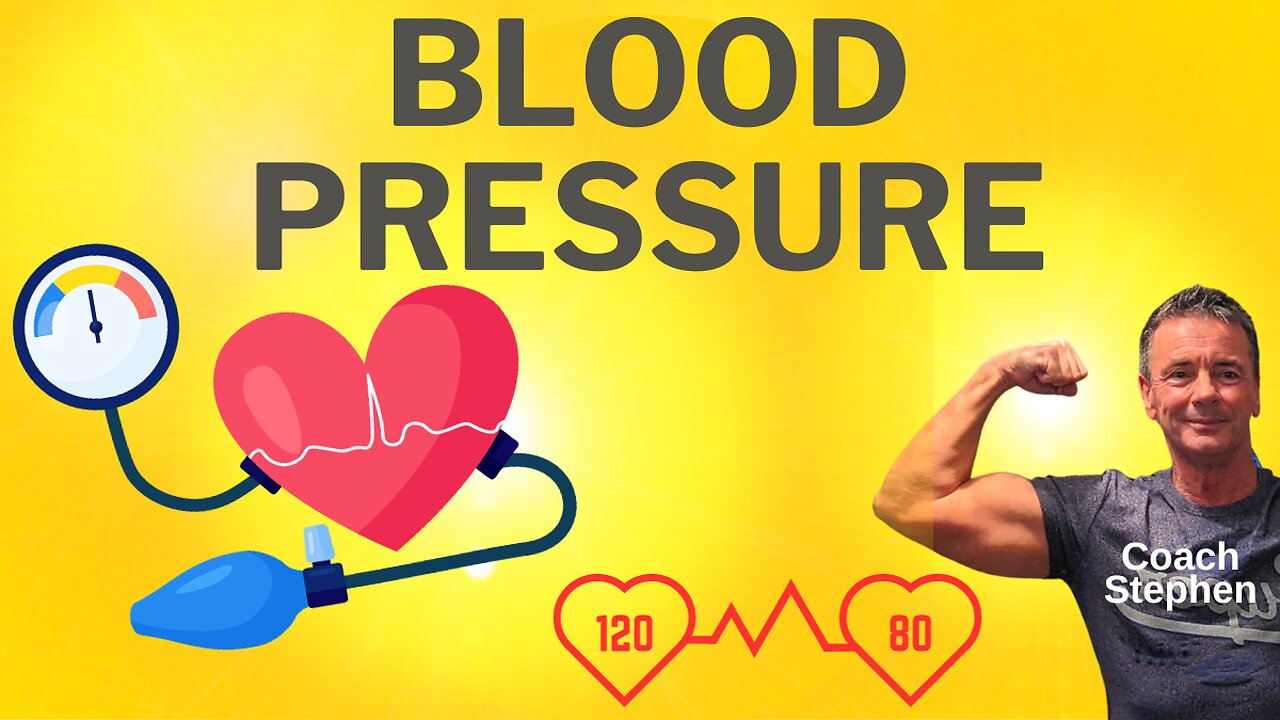Premium Only Content

Understanding Blood Pressure: Hypertension Explained
Understanding Blood Pressure: Hypertension Explained
In this video Coach Stephen discuss the basics of blood pressure, also known as hypertension. They explain how blood pressure is a response, not a disease, and how it is affected by various factors such as salt intake, insulin levels, body composition, and vessel health. The video debunks the common misconception that salt is the primary cause of high blood pressure and emphasizes the importance of maintaining the right level of salt for individual body needs. Coach Stephen also address the role of insulin and its impact on sodium retention. Additionally, he discusses the timeline for potential improvement in blood pressure and share tips for strengthening the heart.
0:00 Introduction
00:10 Blood pressure is a response, not a disease, and it varies based on the delivery of blood.
- Blood pressure is the pressure exerted by the arteries when the heart pumps blood out (systolic) and when it fills up with blood (diastolic).
- The volume of blood pumped by the heart determines blood pressure.
01:40 Blood pressure varies based on age and physical characteristics.
- As we age, our arteries stiffen and require more pressure to pump blood.
- Physical characteristics like height can also affect blood pressure.
03:01 Blood pressure varies among individuals due to various factors.
- The level of physical activity, body composition, climate, and other factors influence blood pressure.
- Understanding blood pressure as a response rather than a disease can help reduce worry and focus on managing it.
04:18 Higher insulin levels lead to water retention, resulting in decreased artery circumference and increased blood pressure.
- Insulin impacts the regulation of sodium and uric acid levels, leading to water retention.
- Sodium is necessary to maintain fluid volume in the blood vessels and the appropriate blood pressure.
05:46 Reducing insulin levels through a low-carb or carnivore diet can lead to a decrease in blood pressure.
- High insulin levels cause the body to retain sodium, resulting in high blood pressure.
- By reducing insulin levels, the body excretes more sodium, leading to a decrease in blood pressure.
07:09 High blood pressure can be present even in individuals who are not overweight.
- Excess weight puts additional strain on the body, requiring more nutrients and volume in the blood, leading to increased blood pressure.
- Even after losing weight, high blood pressure may persist if the underlying insulin issue is not addressed.
08:25 Fixing insulin levels leads to a continual lowering of blood pressure.
- The reduction in blood pressure may not be low enough for some individuals who are concerned about the numbers.
- Lowering inflammation is crucial for reducing blood pressure, more so than cholesterol or salt intake.
09:42 Low carb diet can lower blood pressure.
- Eating a carnivore diet for 150 days can lead to resolution of blood pressure issues.
- Some people may see smaller decreases in blood pressure in as little as 7 weeks.
-
 32:59
32:59
the UK carnivore
9 months ago $1.11 earnedThe ultimate guide to keto and carnivore: live Q&A tips for success
1.33K3 -
 5:48:40
5:48:40
Dr Disrespect
17 hours ago🔴LIVE - DR DISRESPECT - THE SHOTTY BOYS - WARZONE, PUBG, FORTNITE
229K43 -
 2:12:50
2:12:50
Adam Carolla
19 hours agoDouble Murder Convict to be executed by Firing Squad + Comedian Elon Gold + Comedian Carol Leifer
90K17 -
 46:08
46:08
Kimberly Guilfoyle
15 hours agoBad Day to be a Bad Guy: FBI Taking Down World’s Worst Criminals, Live with John Nantz | Ep.203
187K65 -
 DVR
DVR
Redacted News
13 hours agoWhat's REALLY going on in Syria? | Redacted with Natali Morris
191K133 -
 54:18
54:18
Candace Show Podcast
14 hours agoHarvey Speaks: Jessica Mann & The Five Year Affair | Ep 3
206K87 -
 56:53
56:53
Grant Stinchfield
12 hours ago $9.41 earnedFreeze Spending & Kick the Can Down the Road... Why Republicans Should do Just That!
111K16 -
 56:48
56:48
VSiNLive
13 hours agoFollow the Money with Mitch Moss & Pauly Howard | Hour 1
85.7K1 -
 3:28:27
3:28:27
Barry Cunningham
14 hours agoTRUMP DAILY BRIEFING: INTERNET UNDER ATTACK! X & RUMBLE DOWN! EXECUTIVE ORDER SIGNING!
103K62 -
 5:53:56
5:53:56
Scammer Payback
17 hours agoCalling Scammers Live
88.4K6